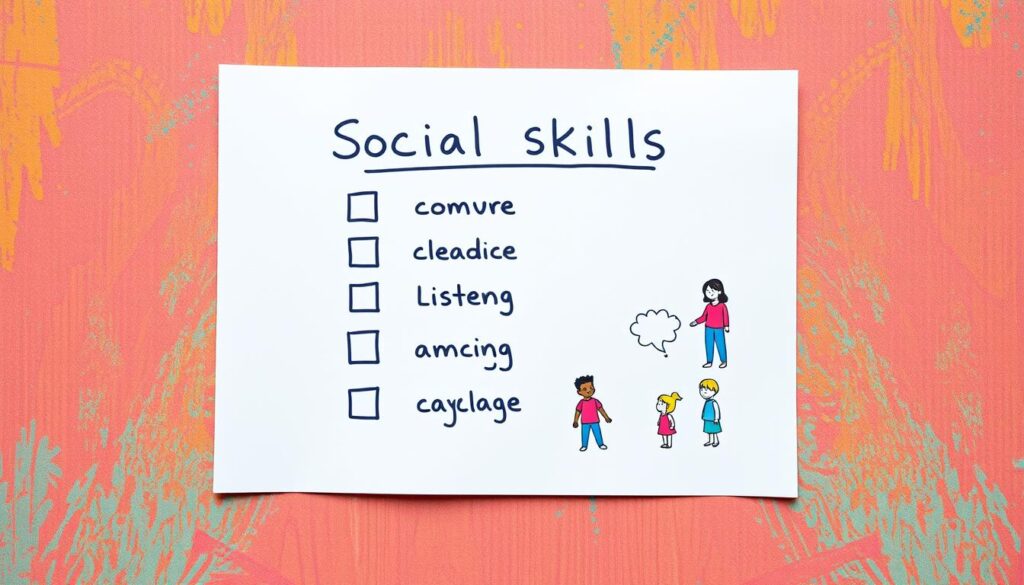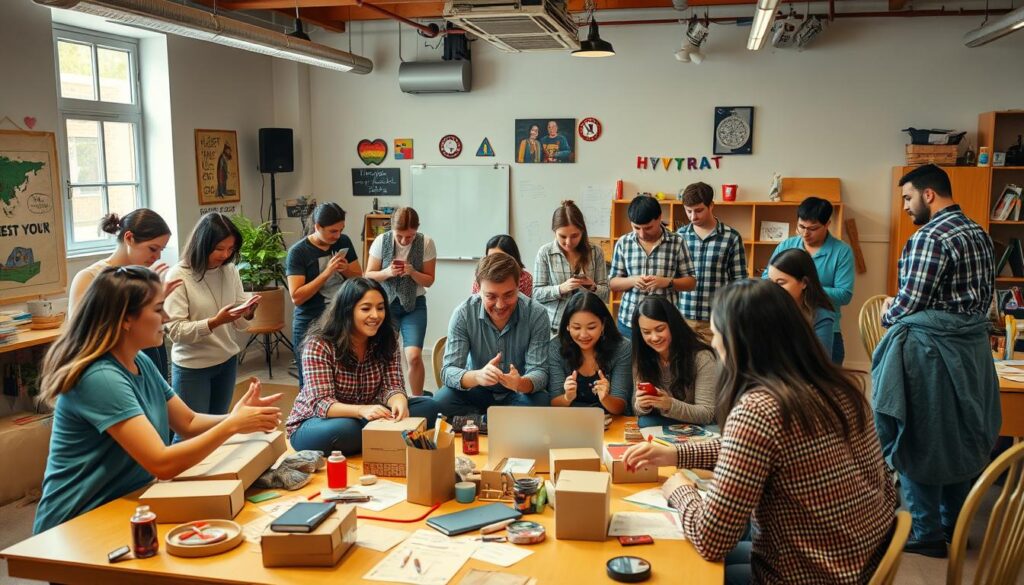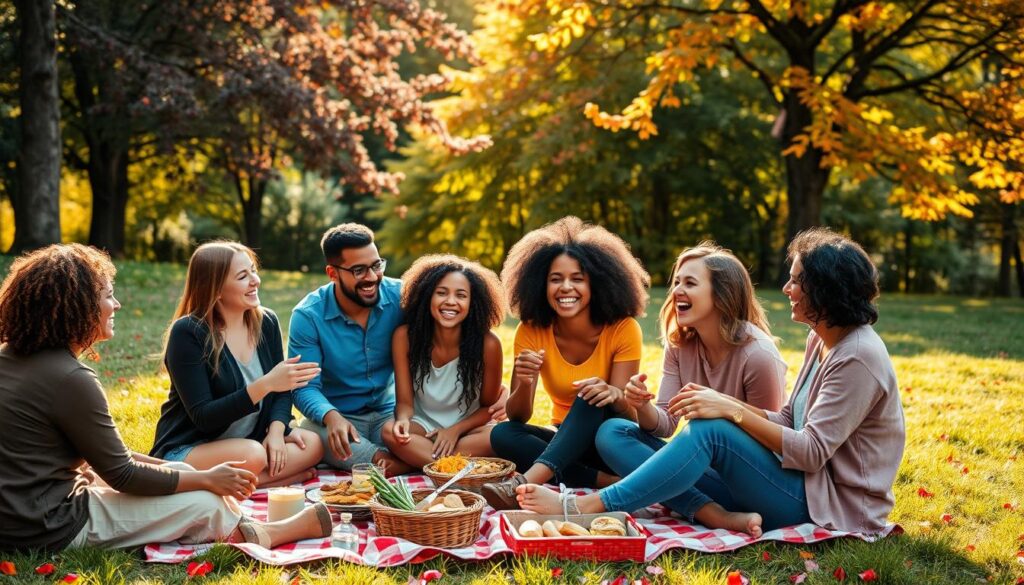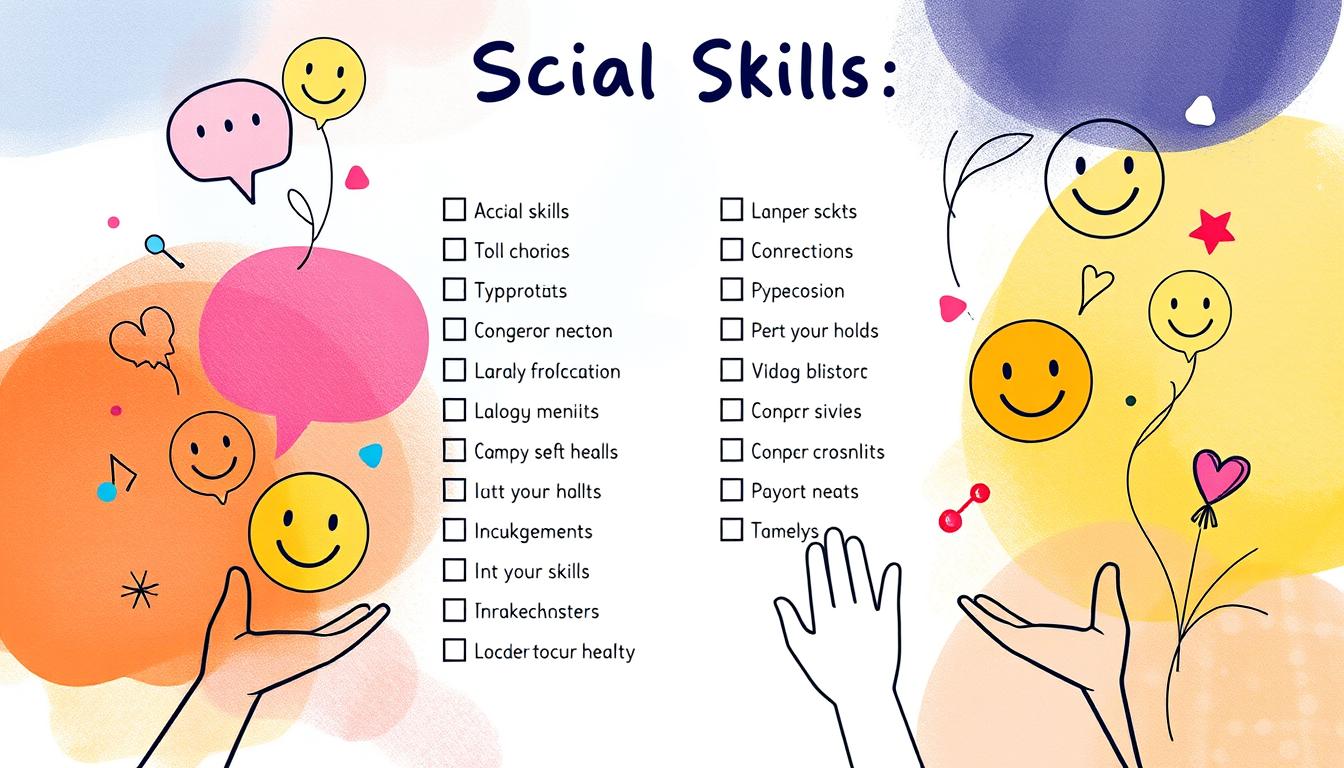Have you ever felt uncomfortable in social settings? You’re not alone. Many people face social anxiety. Imagine being in a crowd, your heart pounding, thinking about what to say next. Each pause can seem like a huge obstacle. But remember, every challenge is a chance to grow.
It’s not just about avoiding awkwardness. It’s about building social confidence and turning interactions into meaningful connections. Social ease is achievable, and this article will guide you. You’ll learn 27 secrets to improve your social skills, whether you’re starting a conversation or feeling the pressure to compare yourself to others.
Many feel the burden of social anxiety. Over 75% of PhD candidates in their fourth year worry about family questions regarding their studies, while 20% compare themselves to their peers in corporate worlds. You should feel confident and present, not pressured.
Let’s explore these secrets and give you a vital checklist for social skills. Improving your social interactions strengthens your resolve. Each tip aims to boost your social skills and celebrate what makes you unique. Let’s start this journey to master social ease together!
Key Takeaways
- Social confidence can mitigate feelings of anxiety in various settings.
- Understanding your triggers aids in overcoming awkwardness.
- Practicing effective social skills enhances interpersonal interactions.
- Celebrating small wins builds a foundation for greater confidence.
- Regular communication can foster supportive relationships.
Introduction to Social Ease
Social ease is about feeling comfy talking and being with others. Some people, especially those with unique quirks, find this hard. They need to face these challenges and accept what makes them special.
The journey to social ease begins with loving who you are. It’s about practicing in a friendly space where mistakes are okay. This way, you can get better at making real friends.
Getting better at social skills can be tough at times. It’s important to see awkward moments as chances to grow. When you look back and think about what to do better next time, you’re on your way to being more outgoing and making great connections.
Understanding Social Anxiety
Social anxiety affects millions in the U.S. About 15 million adults face Social Anxiety Disorder yearly. That’s around 7% of the population. This issue often starts early, with 36% feeling symptoms before turning 10. It’s vital to understand this anxiety for those overwhelmed by social interactions.
Signs of Social Anxiety
Identifying social anxiety signs is key to tackling the issue. Key symptoms include:
- Excessive worry about social interactions.
- Fear of being judged or scrutinized by others.
- Physical signs like sweating, trembling, or a lump in the throat.
- Avoiding social situations.
- Struggling to speak in public.
About 90% of those with this condition fear negative judgment. This fear often leads to struggles in everyday life and relationships.
Common Triggers
Knowing what triggers social anxiety is crucial for managing it. Typical triggers are:
- Unfamiliar social settings.
- Public speaking engagements.
- Meeting new people.
- Large group gatherings.
- Being the center of attention.
30% of people with this disorder self-medicate, increasing dependency risks. Being in social spots can feel like being “alone in a crowded room.” Understanding triggers and recognizing social anxiety signs can help develop coping strategies.

Importance of Social Confidence
Social confidence is key to better personal and professional relationships. It helps you communicate well, which is essential for making connections and finding opportunities. With confidence, you’re more open to talking with others, whether at work, parties, or out casually.
It’s crucial to know how social skills benefit us. They make working with others easier, enhance friendships, and widen networking. Confident people handle rejection well and take on challenges boldly. This leads to more successful interactions, boosting confidence even more.

Being true to yourself in social situations is rewarding. Introverts, for instance, enjoy groups more when they embrace their nature. Avoiding small talk for deeper discussions can fulfill the need for meaningful connections. This brings lasting happiness beyond brief chats.
Practicing social skills brings real improvement. Recording your practice can show you’re less awkward than you think. Focusing on meaningful conversations helps your emotional health. Just one significant talk can make you feel good for days.
To conclude, growing your social confidence improves your life and well-being. Working on self-assurance helps you personally and professionally. It enables you to excel in various settings.
| Aspect | Impact of Social Confidence |
|---|---|
| Communication Skills | Improvement in expressing ideas clearly and effectively. |
| Relationship Building | Strengthens personal and professional connections. |
| Job Opportunities | Increases likelihood of success in interviews and networking events. |
| Emotional Resilience | Enhances ability to cope with rejection and setbacks. |
| Social Engagement | Encourages participation in diverse social activities. |
27 Secrets & 20-Point Checklist on How Not to Be Awkward for the Quirky Ones
It can be tough to get better at social skills, especially if you’re a bit quirky. Learning tips to feel more at ease with others can change your life. Here are secrets that can help you stop feeling awkward and start feeling good in social situations.
Secret 1: Embrace Your Quirks
Feeling good about what makes you different builds confidence. When you accept yourself, you’re real. This helps you make true friends.
Secret 2: Active Listening
Showing you’re really interested in what someone says is key. Listen closely, then say something back that shows you got it.
Secret 3: Use Positive Body Language
Your body says a lot before you even speak. Keep open, smile, and nod to show you’re friendly and welcoming.
Secret 4: Start Small with Conversations
Begin talking in places you feel safe. Even a simple compliment can open the door to more meaningful talks later.
Secret 5: Practice Empathy
Seeing things from another’s point of view improves how you relate. Empathy leads to better responses and deeper connections.
Secret 6: Use Humor Wisely
A joke at the right time can lighten the mood. Used well, humor builds a feeling of togetherness and relaxes everyone.
Secret 7: Develop Your Interests
Having hobbies makes you more interesting. Talk about what you love. This makes conversations better and can impress others.
Secret 8: Be Present in the Moment
Focus on what’s happening now, not the past or future. Being present leads to real connections.
Secret 9: Ask Open-Ended Questions
Keep talks going with questions that need more than a yes or no. This makes chatting more fun and lively.
Secret 10: Know When to Share
Find the right time to talk about yourself. Smart sharing builds trust but keeps your private life private.
Secret 11: Mirror Positive Behaviors
Copy the good signals others send, like smiles. This subtle mirroring can make everyone feel more connected.
Secret 12: Read the Room
Notice how a group feels. Understanding the vibe helps you add to the mood in good ways.
Secret 13: Maintain Eye Contact
Looking someone in the eye shows you’re confident and interested. The right balance makes for better chats.
Secret 14: Handle Awkward Moments Gracefully
Don’t sweat the awkward silences. A funny remark can make things lighter and show you’re relaxed.
Secret 15: Build Your Confidence Through Practice
The more you mingle, the better you get. Regular practice makes socializing easier in any setting.
Secret 16: Know Your Triggers
Knowing what makes you uneasy helps you get ready. You can plan how to stay calm.
Secret 17: Don’t Take Yourself Too Seriously
Keep things light. Being able to laugh at yourself eases tension and draws people to you.
Secret 18: Perfect Your Elevator Pitch
Create a brief intro that shows who you are and what you love. This sparks interesting chats.
Secret 19: Join Social Groups
Being part of groups lets you practice in a friendly place. Common interests make talking easier and help friendships grow.
Secret 20: Celebrate Small Wins
Treasure every step forward, no matter how small. Thankfulness for progress makes you more confident and keen to keep going.
Secret 21: Accept Flaws
Understanding no one is perfect lowers pressure on yourself. Love your flaws as they make you unique.
Secret 22: Be Authentic
Being real attracts true friends. Stay true to yourself to better your social life.
Secret 23: Use Pop Culture References
Talking about popular culture can excite. Common topics make chatting easy and less awkward.
Secret 24: Control Your Breathing
When nervous, focus on breathing deeply. This calms your heart and helps you socialize better.
Secret 25: Focus on the Other Person
Worrying less about yourself and more about the other person reduces stress. It leads to more meaningful talks.
Secret 26: Visualize Positive Outcomes
Imagine doing well before mingling. This mindset reduces worry and sets you up for great conversations.
Secret 27: Ask for Feedback
Find out how you’re doing by asking. Useful advice helps you improve and grow socially.

Essential 20-Point Checklist for Social Ease
Social success checklist can make boosting your social skills easier. Here’s a 20-point checklist to help you handle social situations better. It offers practical advice for your daily interactions.

- Practice active listening to show genuine interest in others.
- Maintain positive body language, such as open gestures and a relaxed posture.
- Start small by greeting acquaintances and gradually engaging in conversation.
- Ask open-ended questions to encourage deeper discussions.
- Focus on the other person during conversations to foster connection.
- Use humor appropriately to lighten the mood.
- Embrace your quirks rather than hiding them.
- Mirror the body language and expressions of those around you.
- Practice empathy by validating the feelings and experiences of others.
- Know when to share personal anecdotes to build rapport.
- Maintain eye contact to convey attentiveness.
- Handle awkward moments with grace and a lighthearted attitude.
- Join groups or clubs that align with your interests to meet like-minded people.
- Visualize positive outcomes before entering social situations.
- Control your breathing to manage anxiety when speaking in public.
- Accept flaws in yourself and others to create a non-judgmental atmosphere.
- Celebrate small victories in social interactions to build confidence.
- Perfect your elevator pitch for casual networking opportunities.
- Know your triggers and develop strategies to cope with them.
- Seek feedback from friends to improve your social skills.
Keep this checklist handy as a reference for boosting your social skills. Using these tips can lead you to social success and foster strong connections with others.
Practicing Social Skills Regularly
To get better at social skills, practice them often. By acting out real-life situations, you improve. Using role-playing and joining workshops are great ways to grow socially.
Role-Playing Scenarios
Role-playing lets you practice conversations safely. It helps with everything from small talk to deep discussions. By practicing with someone, you can try different ways of speaking and acting. This boosts your confidence.
Try role-playing at:
- Networking events
- One-on-one meetings
- Group discussions
- Social gatherings
Practicing often makes you more comfortable in real interactions. You’ll learn how to deal with silence or surprise questions better.
Join Social Skills Workshops
Social skills workshops offer structured learning. You get to practice with others who want to improve, too. In these workshops, you receive feedback and learn to work with others. They focus on teaching you how to read social signs and connect with people.
Workshops help you by:
- Exposing you to different social situations
- Giving feedback from teachers and peers
- Providing chances for structured role-playing
- Helping you meet people with similar interests
Committing to role-playing and workshops will greatly improve your social interactions.

| Method | Description | Benefits |
|---|---|---|
| Role-Playing | Simulate social interactions in a safe space. | Enhances confidence, reduces anxiety, and helps handle awkward moments. |
| Workshops | Structured environments for practicing social skills with feedback. | Builds rapport, exposes you to diverse scenarios, and encourages self-improvement. |
Overcoming Negative Self-Talk
Negative self-talk can really hold you back. It can make it hard for you to be confident around others. About 70% of entrepreneurs say they’ve dealt with these tough thoughts. Many people, up to 85%, even stop their own progress because they don’t think they’re good enough. To beat these thoughts, you need to know yourself better.
It’s important to think differently about yourself. Notice what you’re good at, not just where you struggle. Talking with friends who support you can build up your mental resilience. They help you fight off those negative thoughts. Even though positive feedback can make you feel 40% better, only a third of people ask for it. It’s a key move to avoid being too hard on yourself.
Women often doubt their skills more than men, by 50%. They find it hard to say they’re valuable, especially when setting prices. Having friends and a mentor who believe in you can be a game changer. They help you see and believe in your own worth.
Learning to change your thoughts can make a big difference. It’s like working out but for your brain. Reflecting on your thoughts and talking it out can cut stress in half. With hard work and a strong support circle, you can quiet those negative voices. And start thinking in a more uplifting way.

Building a Supportive Circle
Creating a supportive social circle boosts your social confidence. Meeting like-minded people leads to real friendships. These connections make social events more fun and lessen loneliness.
Finding Like-Minded Friends
Looking for friends with similar interests can improve your social life. Engaging in clubs, volunteer work, or hobby groups helps forge deep relationships. Here are some ways to do it:
- Join Community Groups: Find local groups that match your hobbies or values. This is a great way to meet people who share your interests.
- Use Social Media: Websites like Meetup or Facebook groups can introduce you to events and people who love what you love.
- Attend Workshops or Classes: Trying new things with others is a fantastic way to make friends and learn together.
Such connections fight off loneliness. Surveys say nearly 20% of Americans feel isolated. A supportive social network lowers loneliness’s bad effects, like anxiety and health risks.
Supportive friends make a lively social circle. Staying active in this group boosts your and others’ happiness. Together, you can tackle loneliness for better social times.

Utilizing Online Resources and Communities
Today, the internet offers many resources to improve your social skills. You can join social communities that match your interests or challenges. This lets you practice talking with others. Forums and social media groups provide safe places for chats. Here, you can get help and advice.
Online learning lets you meet people who think like you. Try joining sites focused on getting better at social skills. You can share stories, ask for help, and get support. These online meetings can make you feel less alone. This is great if you find social situations hard.
Here are some helpful online resources and communities to consider:
| Resource Type | Description | Benefits |
|---|---|---|
| Online Courses | Platforms like Coursera and Udemy offer courses on communication and social skills. | Structured learning, flexibility, and a variety of topics. |
| Support Forums | Websites like Reddit and Quora have dedicated sections for social skills advice. | Peer interaction and shared experiences. |
| Social Media Groups | Facebook groups and LinkedIn communities for skill development. | Networking opportunities and resource sharing. |
| Video Calls | Zoom or Skype meetups for small group interactions. | Real-time practice in a supportive setting. |

These online spots do more than just help you learn. They make you feel part of a community. Talk to others, make friends, and face social challenges together. The internet is a powerful tool for growing your social skills.
Conclusion
Reflecting on your path to better social skills means seeing the value in your unique qualities. It also means practicing social strategies regularly. The tips provided guide you in improving your social interactions and boosting confidence. By using the 27 secrets and the 20-point checklist every day, you’ll get better at handling social situations.
It’s crucial to know that social ease is within reach for everyone. With commitment and effort, you’ll see progress. Every little step helps you feel more relaxed and skilled in social scenes. So, whether you’re chatting with someone or entering a new group, remember that patience and persistence are key.
In essence, real change comes from ongoing practice and being open to growth. Cherish what makes you different, and work on your social abilities. Over time, with dedication, you’ll find that social ease isn’t just possible—it’s a fulfilling achievement. Keep pushing forward!










